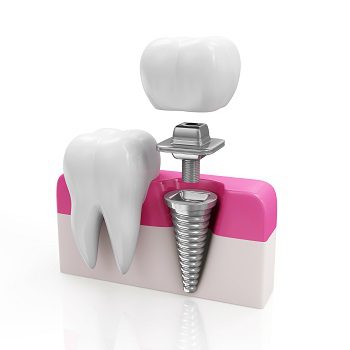Early and Late Dental Implants failure.
Dental Implants Solutions
A dental implant is a surgically placed metal post that supports a prosthetic tooth. Once the implant is in place, a restorative dentist or oral surgeon attaches a replacement tooth. The dental implant success rate is high; however, some patients encounter dental implants failure. It is estimated that 5 to 10% of dental implants fail immediately after the treatment or months or years afterward.
If you have dental implant surgery or already have one, here's what you need to know about implant failure and other potential risks.
What factors affect the success of dental implants?
A variety of factors can influence the success of a dental implant. These are some examples:
- Periodontal disease
Dental implant surgery requires healthy gums; you cannot have this treatment if you have active gum disease.
Gum disease is an infection that can cause gum and jawbone deterioration. Untreated infection around the implant could lead to failure. Before obtaining an implant, see a dentist to treat gum disease.
- Smoking
Smoking can also lead to the failure of dental implants because it reduces blood flow to the gums, hindering the healing process. Several studies have found that smokers have a 20% failure rate for dental implants.
Smoking does not stop you from getting a dental implant. However, if you quit smoking one week before your dental implant placement and don't smoke for at least two months after the implants are placed, you can have a better outcome.
- Inadequate jawbone
A successful operation also requires enough bone to sustain the implant. The surgeon cannot surgically insert the implant into your jaw if there is insufficient healthy bone.
Osteoporosis can cause bone loss. This disorder occurs when bone density declines. Bones grow weaker, and fractures become more likely. Severe gum disease can also lead to bone deterioration in the mouth.
- Medical problems
If you have a disease such as rheumatoid arthritis or diabetes, which causes the body to repair at a slower rate, you may experience dental implant failure. Slow healing can inhibit osseointegration, the process by which the implant fuses or integrates with the bone in your jaw.
Certain drugs might potentially cause dental implant failure. Therefore, discussing any medications (both prescription and over-the-counter) you currently use with your oral surgeon is essential.
Researchers at McGill University discovered in 2016 that heartburn drugs might inhibit new bone formation, influencing how an implant integrates with the jawbone. In 2016, researchers at the University of Buffalo revealed similar findings among antidepressant drug users.
- Poor dental care
The capacity to maintain proper oral care after a dental implant also influences the success rate. Therefore, you are not a good candidate for a dental implant if you do not maintain proper oral and dental health.
- An inexperienced surgeon
Not all surgeons are made equal, and you may encounter dental implant failure if you have an inexperienced surgeon. Your dentist can recommend an oral surgeon, but you are your own.
A skilled surgeon understands how many implants are required to support tooth restoration. This is significant because a small number of implants can produce undue stress on the implant and failure.
Working with a qualified surgeon may also help reduce iatrogenic trauma, an injury to periodontal tissue caused by a dentist's activity.
Select a surgeon with extensive experience. Have them go over the procedure and recovery plan with you. Moreover, during your consultation, ask questions.

Early dental implant failure and complications
Problems or consequences from dental implant surgery can occur immediately or years later. Early dental failure happens between three and four months after the surgery.
Remember that you will suffer pain or discomfort following surgery, which you may manage with pain medication. Even so, consult your surgeon if your ache does disappear within a week. It usually takes three to six months to recover fully.
While pain and swelling are typical after surgery, keep a watch out for the following complications:
Infection at the implant location
Infections can occur during or after surgery. An autoimmune condition, smoking, and poor dental hygiene are all risk factors for disease.
Inadequate bone support
Early-stage failure can also occur when there is insufficient bone actual implant. The implant cannot merge with the jaw if there is inadequate bone.
Allergic reaction
You may have an adverse reaction if you are allergic to titanium alloy, a metal used in some dental implants. An allergy can induce swelling, taste loss, and tingling.
Inform your oral surgeon about your titanium allergy. You will require an implant made of a different substance.
Late dental implant failure and complications
Dental implant surgery can quickly succeed, with issues appearing years later.
Here are some long-term dental implant complications:
- A surgeon's implants too close to a nerve might cause nerve or tissue damage. Injury symptoms include numbness or tingling in the tongue, lips, gums, or face.
- Foreign body reaction is the process by which the body rejects an implant. Foreign body rejection is uncommon, although it does occur. Increased discomfort at the implant site, edema, fever, and chills are all signs of rejection.
- An upper jaw dental implant may extend into the sinus cavity.
- Injury around a dental implant may cause the implant to loosen and fail.
What are the symptoms of dental implant failure?
If you experience early or late-stage dental implants failure, the following symptoms may indicate a complication:
- Gum chewing problem
- Inflammation
- Gum recession
- Loosening of an implant or a replacement tooth
- Severe pain or discomfort
Preventive care
Some dental implants failures are unavoidable; however, you can lower your chances of failure by doing the following:
- Maintain your dental implants properly
- Brush and floss your teeth daily and use mouthwash
- Every six months, go to the dentist
- Quit smoking
- Increase your calcium intake to help your bones stay strong. Take a calcium supplement or consume calcium-rich foods such as milk, yogurt, broccoli, oranges, and cheese
- Consult your dentist about a bruxism mouth guard (teeth grinding)
- Do not expect immediate tooth replacement following an implant treatment
- Avoid practices that harm your teeth (eating ice and candy)
Conclusion
Even though dental implants have a high success rate, they might fail for various reasons.
Therefore, it's critical to understand the potential hazards so you may make efforts to increase your chances of success. This involves getting treatment for gum or bone abnormalities before surgery, choosing a skilled surgeon, and practicing proper dental hygiene before and after surgery.
Contact your Walnut Creek Implant dentist, Massood Darvishzadeh, DDS at Dental Implant Solutions, to learn more about Early and late dental implant failure.
Resource:
DENTAL IMPLANT WORTH THE TIME?
This media/content or any other on this website does not prescribe, recommend, or prevent any treatment or procedure. Therefore, we highly recommend that you get the advice of a qualified dentist or other medical practitioners regarding your specific dental condition.
Subscribe To Our Newsletter
Get Updates And Learn From The Best
More To Explore



CONTACT US
Massood Darvishzadeh, DDS
2021 Mt Diablo Blvd., Suite 100A
Walnut Creek, CA 94596
(925) 939-2600info@dentalimplantsolutions.net